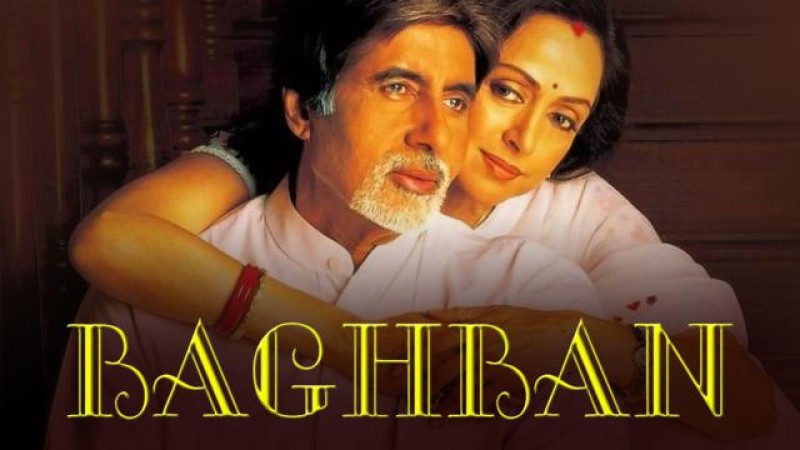
The world of film is rife with tales of inspiration, where a director's inspiration strikes from the most unlikely places. The legendary Bollywood director B.R. Chopra, whose iconic film "Baghban" resonated with audiences of all ages, is one such remarkable story. Many people may not be aware of the fact that Chopra had the idea for this touching and emotional masterpiece brewing in his head for more than three decades, ever since a chance meeting in Copenhagen, Denmark. The genesis of "Baghban" and the profound influence a single encounter had on the creative visionary filmmaker are explored in this article.
"Baghban," a film by B.R. Chopra that would explore the themes of parental love, sacrifice, and filial duty, was first released in 2003. It would touch the deepest parts of our hearts. However, much earlier and in the most unlikely of circumstances, in a faraway land, this idea's seeds were already planted.
In the early 1970s, Chopra traveled to Copenhagen, Denmark, mainly for leisure purposes and to escape the hectic pace of the Mumbai film industry. He had no idea how deeply this encounter would affect his creative spirit. One fateful day, as he was ambling through Copenhagen's picturesque streets, he came across a retirement home, a place where people in their golden years lived out their final years.
Chopra had a chance encounter inside the retirement community that would stay with him for the rest of his life. He came across an elderly woman who was spending her final years alone and depressed. She started a conversation with Chopra, who then listened to her moving story. She confessed to him, her voice shaking with a mixture of grief and rage, that her own children had abandoned her at this nursing home and had neglected to pay her any further visits.
Chopra was greatly affected by this realization. It served as a reminder for him that he had to change his ways. His childhood in India, where parents were revered and respected, and this heartbreaking abandonment in Denmark stood in stark contrast to those cultural values, and they left an everlasting impression on him. He struggled to understand how kids could reject the very people who had raised them and made sacrifices for them.
Despite having a heavy heart, Chopra had a burning idea when she returned to India. He aimed to convey a powerful social allegory through a story that would be both entertaining and thought-provoking. He was interested in delving deeply into the moral obligations and complicated dynamics of parent-child relationships. This was how "Baghban" came to be.
Chopra patiently tended to this idea over the following three decades, allowing it to develop and become more developed. He saw how the dynamics of families were changing, how materialism was growing, and how societal values were changing. As a constant reminder of the story he needed to tell, the memory of that elderly woman in Copenhagen remained seared into his mind throughout the entire time.
When it eventually came to pass, "Baghban" was a distinctive and ambitious project. Raj and Pooja Malhotra were the movie's main characters, and Amitabh Bachchan and Hema Malini played them. The movie tells the tale of a loving couple who, after making sacrifices for their children their entire lives, find themselves alone and abandoned in their old age when their children put themselves first.
Chopra had to overcome a number of obstacles to realize this idea. First, the story needed to accurately and nuancedly depict the emotions involved. The movie had to find a way to evoke strong emotions without becoming overly dramatic. Second, the star cast had to be selected with care. Amitabh Bachchan and Hema Malini contributed their vast talent and years of experience to the project, ensuring that the emotional complexity of the characters was effectively communicated.
Millions of viewers were moved by "Baghban" when it first aired. The older generation in particular, who could identify with the characters' plight, found it to be very moving. The film did not hesitate to address uncomfortable truths about society's shifting values, and Chopra's compassionate storytelling was evident throughout.
In addition, "Baghban" sparked significant discussions about intergenerational relationships and how India treats its elderly. It compelled individuals to reassess their priorities and consider their own obligations to their parents.
The path taken by B.R. Chopra from a chance meeting in Copenhagen to the creation of "Baghban" is evidence of the potency of narrative and the long-lasting effects of human experiences. One of Chopra's genius traits was his ability to craft a story that was not only emotionally moving, but also socially relevant.
"Baghban" is still regarded as a significant film in the history of Indian cinema, not only for its artistic merits but also for the dialogue it spurred on the subject of caring for elderly parents. It serves as a moving reminder of the principles that bind families together and the ethical duties that transcend generations. Ultimately, Chopra's inspiration and his three-decade journey from Copenhagen to Bollywood gave us a movie that will touch people's hearts and spur change for future generations.
Aamir Khan's 'Dangal' Diet and Workout
A Deep Dive into His Role in 'Vivah' After 'Hum Aapke Hain Koun..!'
Vivah: The Game-Changer that Redefined Indian Movie Distribution